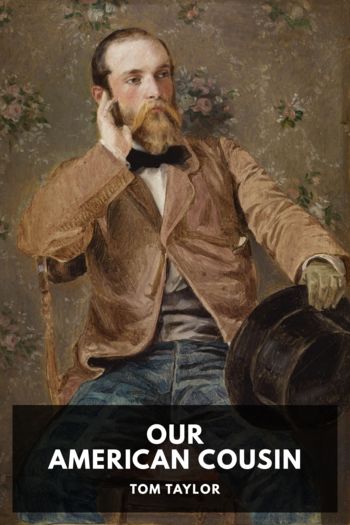Struggles and Triumphs, P. T. Barnum [good books to read in english .txt] 📗

- Author: P. T. Barnum
Book online «Struggles and Triumphs, P. T. Barnum [good books to read in english .txt] 📗». Author P. T. Barnum
While travelling with our teams and show through a desolate part of Georgia, our advertiser, who was in advance of the party, finding the route, on one occasion, too long for us to reach a town at night, arranged with a poor widow woman named Hayes to furnish us with meals and let us lodge in her hut and outhouses. It was a beggarly place, belonging to one of the poorest of “poor whites.” Our horses were to stand out all night, and a farmer, six miles distant, was to bring a load of provender on the day of our arrival. Bills were then posted announcing a performance under a canvas tent near Widow Hayes’s, for, as a show was a rarity in that region, it was conjectured that a hundred or more small farmers and “poor whites” might be assembled and that the receipts would cover the expenses.
Meanwhile, our advertiser, who was quite a wag, wrote back informing us of the difficulties of reaching a town on that part of our route and stating that he had made arrangements for us to stay overnight on the plantation of “Lady Hayes,” and that although the country was sparsely settled, we could doubtless give a profitable performance to a fair audience.
Anticipating a fine time on this noble “plantation,” we started at four o’clock in the morning so as to arrive at one o’clock, thus avoiding the heat of the afternoon. Towards noon we came to a small river where some men, whom we afterwards discovered to be down-east Yankees, from Maine, were repairing a bridge. Every flooring plank had been taken up and it was impossible for our teams to cross. “Could the bridge be fixed so that we could go over?” I inquired; “No; it would take half a day, and meantime if we must cross, there was a place about sixteen miles down the river where we could get over.” “But we can’t go so far as that; we are under engagement to perform on Lady Hayes’s place tonight and we must cross here. Fix the bridge and we will pay you handsomely.”
They wanted no money, but if we would give them some tickets to our show they thought they might do something for us. I gladly consented and in fifteen minutes we crossed that bridge. The cunning rascals had seen our posters and knew we were coming; so they had taken up the planks of the bridge and had hidden them till they had levied upon us for tickets, when the floor was re-laid in a quarter of an hour. We laughed heartily at the trick and were very glad to cross so cheaply.
Towards dinner time, we began to look out for the grand mansion of “Lady Hayes,” and seeing nothing but little huts we quietly pursued our journey. At one o’clock—the time when we should have arrived at our destination—I became impatient and riding up to a poverty-stricken hovel and seeing a ragged, barefooted old woman, with her sleeves rolled up to her shoulders, who was washing clothes in front of the door, I inquired—
“Hallo! can you tell me where Lady Hayes lives?”
The old woman raised her head, which was covered with tangled locks and matted hair, and exclaimed—
“Hey?”
“No, Hayes, Lady Hayes; where is her plantation?”
“This is the place,” she answered; “I’m Widder Hayes and you are all to stay here tonight.”
We could not believe our ears or eyes; but after putting the dirty old woman through a severe cross-examination she finally produced a contract, signed by our advertiser, agreeing for board and lodging for the company and we found ourselves booked for the night. It appeared that our advertiser could find no better quarters in that forlorn section and he had indulged in a joke at our expense by exciting our appetites and imaginations in anticipation of the luxuries we should find in the magnificent mansion of “Lady Hayes.”
Joe Pentland grumbled, Bob White indulged in some very strong language, and Signor Vivalla laughed. He had travelled with his monkey and organ in Italy and could put up with any fare that offered. I took the disappointment philosophically, simply remarking that we must make the best of it and compensate ourselves when we reached a town next day.
When the old woman called us to dinner we crept into her hut and found that she had improvised benches at her table by placing boards upon the only four chairs in her possession, and at that, some of us were obliged to stand. The dinner consisted of a piece of boiled smoked bacon, a large dish of “greens,” and corn bread. Three plates, two knives, and three forks made up the entire table furniture and compelled a resort to our jackknives. “A short horse is soon curried,” and dinner was speedily despatched. It did not seem possible for an audience to assemble





Comments (0)